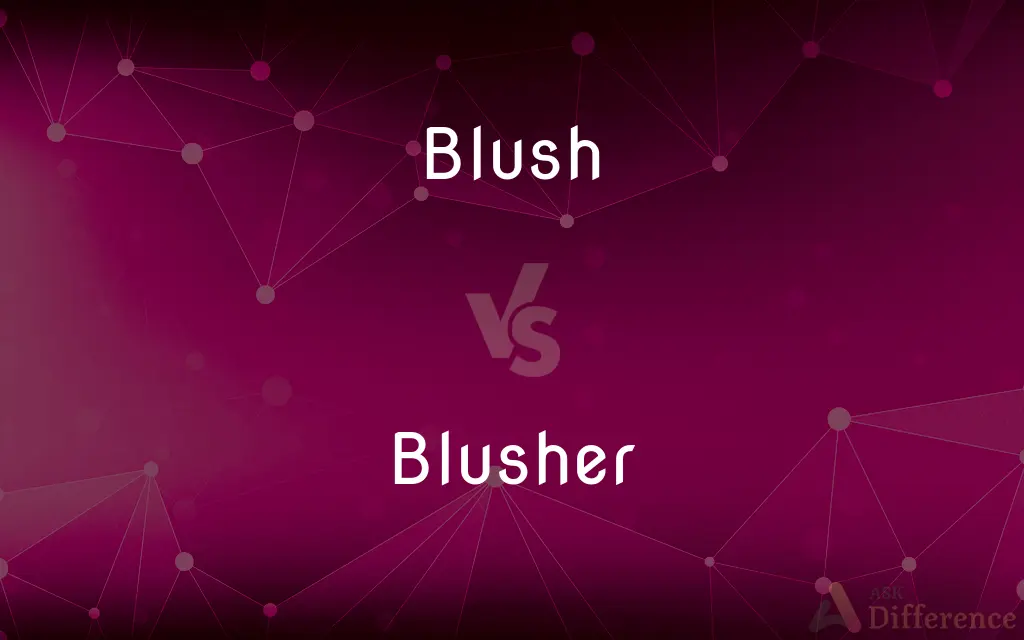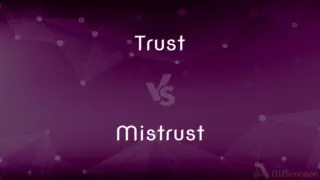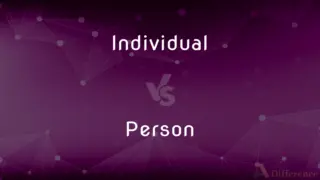Blush vs. Blusher — What's the Difference?
By Tayyaba Rehman & Maham Liaqat — Updated on April 22, 2024
Blush and blusher refer to the same cosmetic product, used to add a tint of color to cheeks, but "blush" is more commonly used in American English, whereas "blusher" is preferred in British English.

Difference Between Blush and Blusher
Table of Contents
ADVERTISEMENT
Key Differences
Blush is commonly used in American English to describe a cosmetic product applied to the cheeks to give a rosy tone, whereas blusher is the term more frequently used in British English for the same purpose.
Blush often comes in powder, cream, or gel forms, designed to enhance the complexion subtly, while blusher can also be found in these formats, emphasizing its versatility in makeup routines.
Blush is typically marketed with a focus on creating a naturally flushed look, enhancing the wearer's natural glow, whereas blusher might also be presented with an emphasis on sculpting and defining the face.
Blush tends to be associated with everyday makeup looks, aiming for a light and natural effect, whereas blusher can be used more dramatically in more elaborate beauty applications.
Blush applications often suggest a gentle application with a brush along the cheekbones, whereas blusher may be applied more liberally, depending on the desired intensity of the color and contour.
ADVERTISEMENT
Comparison Chart
Preferred Region
Predominantly used in American English
Commonly used in British English
Formats Available
Powder, cream, gel
Powder, cream, gel
Purpose in Makeup
Enhance natural complexion, add a rosy tint
Add color, define and sculpt features
Usage in Makeup
Aimed for a natural, subtle glow
Used for both subtle enhancement and dramatic looks
Application Style
Light application, focused on cheekbones
Can be applied liberally, varies by desired effect
Compare with Definitions
Blush
Often applied with a dedicated brush.
Using a fluffy brush, she dusted blush across her cheekbones.
Blusher
Integral part of a full makeup routine.
Her makeup routine is incomplete without applying some blusher.
Blush
A cosmetic product to color the cheeks.
She applied peach blush to brighten her face.
Blusher
Can be used to sculpt the face.
She used dark blusher under her cheekbones for a contoured look.
Blush
Enhances facial features subtly.
A little blush goes a long way in enhancing her smile.
Blusher
Sometimes applied more heavily for dramatic effect.
For the photoshoot, the makeup artist applied a bold blusher.
Blush
Available in multiple formats like powder and cream.
Her favorite blush is a cream because it blends easily.
Blusher
British term for cosmetic used on cheeks.
She tapped some blusher onto her cheeks before the party.
Blush
Used to create a natural-looking flush.
He chose a blush that matched his skin's natural undertone.
Blusher
Comes in various shades to match different skin tones.
She found a blusher that perfectly complemented her dark skin.
Blush
Show shyness, embarrassment, or shame by becoming red in the face
Kate felt herself blushing scarlet
She blushed at the unexpected compliment
Blusher
The blusher is the common name for several closely related species of the genus Amanita. A. rubescens or the blushing amanita, is found in Europe and eastern North America, and A. novinupta, also known as the new bride blushing amanita, is found in western North America.
Blush
Be or become pink or pale red
The trees are loaded with blushing blossoms
Blusher
A cosmetic of a powder or cream consistency used to give a warm colour to the cheeks.
Blush
A reddening of the face as a sign of shyness, embarrassment, or shame
He had brought a faint blush to her cheeks
Blusher
A toadstool with a buff cap bearing fluffy white spots and with white flesh that turns pink when bruised or cut, found in woodland in Eurasia and North America.
Blush
A pink or pale red tinge
The roses were white with a lovely pink blush
Blusher
One who blushes.
Blush
A wine with a slight pink tint made in the manner of white wine but from red grape varieties
Blush Zinfandel
Blusher
See blush.
Blush
Another term for blusher (sense 1)
Blusher
(countable) Agent noun of blush; one who blushes.
Blush
To become red in the face, especially from modesty, embarrassment, or shame; flush.
Blusher
Face makeup that makes the cheeks rosier.
Blush
To become red or rosy.
Blusher
(countable) Any of several closely related, edible species of the genus Amanita, including Amanita rubescens and Amanita novinupta.
Blush
To feel embarrassed or ashamed
Blushed at his own audacity.
Blusher
One that blushes.
Blush
A reddening of the face, especially from modesty, embarrassment, or shame.
Blusher
Yellowish edible agaric that usually turns red when touched
Blush
A red or rosy color
The blush of dawn.
Blusher
Makeup consisting of a pink or red powder applied to the cheeks
Blush
A glance, look, or view
Thought the painting genuine at first blush.
Blush
Makeup used on the face and especially on the cheekbones to give a usually rosy tint. Also called blusher.
Blush
An act of blushing; a red glow on the face caused by shame, modesty, etc.
Blush
A glow; a flush of colour, especially pink or red.
Blush
(figuratively) Feeling or appearance of optimism.
Blush
A sort of makeup, frequently a powder, used to redden the cheeks.
Blush
A color between pink and cream.
Blush
A pale pink wine made by removing the dark grape skins at the required point during fermentation.
Blush
The collective noun for a group of boys.
A blush of boys.
Blush
(intransitive) To become red in the face (and sometimes experience an associated feeling of warmth), especially due to shyness, shame, excitement, or embarrassment.
The love scene made him blush to the roots of his hair / to the tips of his ears.
He wasn't used to this much attention, so he blushed as he saw dozens of pairs of eyes watching him.
Blush
To be ashamed or embarrassed (to do something).
Blush
(intransitive) To become red.
Blush
(transitive) To suffuse with a blush; to redden; to make rosy.
Blush
(copulative) To change skin color in the face (to a particular shade).
When he saw it, he blushed a beet red.
I wasn't surprised, but it was embarrassing enough that I blushed a little pink.
Blush
(transitive) To express or make known by blushing.
Looking at me with a knowing glare, she blushed her discomfort with the situation.
Blush
(intransitive) To have a warm and delicate colour, like some roses and other flowers.
The garden was full of blossoms that blushed in myriad shades to form a beautiful carpet of color.
Blush
To glance with the eye, cast a glance.
Blush
Of dope or varnish: to develop an undesirable white precipitate on the surface, due to being applied in humid conditions.
Blush
To become suffused with red in the cheeks, as from a sense of shame, modesty, or confusion; to become red from such cause, as the cheeks or face.
To the nuptial bowerI led her blushing like the morn.
In the presence of the shameless and unblushing, the young offender is ashamed to blush.
He would strokeThe head of modest and ingenuous worth,That blushed at its own praise.
Blush
To grow red; to have a red or rosy color.
The sun of heaven, methought, was loth to set,But stayed, and made the western welkin blush.
Blush
To have a warm and delicate color, as some roses and other flowers.
Full many a flower is born to blush unseen.
Blush
To suffuse with a blush; to redden; to make roseate.
To blush and beautify the cheek again.
Blush
To express or make known by blushing.
I'll blush you thanks.
Blush
A suffusion of the cheeks or face with red, as from a sense of shame, confusion, or modesty.
The rosy blush of love.
Blush
A red or reddish color; a rosy tint.
Light's last blushes tinged the distant hills.
Blush
A rosy color (especially in the cheeks) taken as a sign of good health
Blush
Sudden reddening of the face (as from embarrassment or guilt or shame or modesty)
Blush
Turn red, as if in embarrassment or shame;
The girl blushed when a young man whistled as she walked by
Blush
Become rosy or reddish;
Her cheeks blushed in the cold winter air
Common Curiosities
What is blush used for?
Blush is used to add a rosy or natural tint to the cheeks, enhancing the complexion.
How do you apply blush properly?
Apply blush on the cheekbones, blending upwards towards the temples for a natural look.
Is blusher different from blush?
Blusher is essentially the same as blush but is the preferred term in British English.
Can men wear blush or blusher?
Yes, both blush and blusher can be worn by anyone looking to add color to their cheeks.
How do I choose the right shade of blusher?
Choose a blusher shade based on your skin tone; cooler shades work well for lighter skin, while warmer, deeper shades are ideal for darker skin tones.
Which is better for oily skin, blush or blusher?
Both come in formulations suitable for oily skin, particularly in powder form.
What types of blush are available?
Blush is available in various types including powder, cream, gel, and liquid, each suitable for different skin types and desired effects.
What is the difference in application techniques for blush and blusher?
The main difference lies in intensity; blush is typically applied lightly for a subtle effect, whereas blusher can be applied more heavily for contouring or a bolder look.
Can blusher be used for more than just cheeks?
Yes, blusher can also be used on other parts of the face, such as the temples and eyes, to create a cohesive makeup look.
How long does blush typically last on the skin?
The longevity of blush on the skin depends on the formula: powder blushes may last 4-6 hours, while cream or gel blushes can last up to 8 hours or more.
Share Your Discovery

Previous Comparison
Trust vs. Mistrust
Next Comparison
Individual vs. PersonAuthor Spotlight
Written by
Tayyaba RehmanTayyaba Rehman is a distinguished writer, currently serving as a primary contributor to askdifference.com. As a researcher in semantics and etymology, Tayyaba's passion for the complexity of languages and their distinctions has found a perfect home on the platform. Tayyaba delves into the intricacies of language, distinguishing between commonly confused words and phrases, thereby providing clarity for readers worldwide.
Co-written by
Maham Liaqat












































